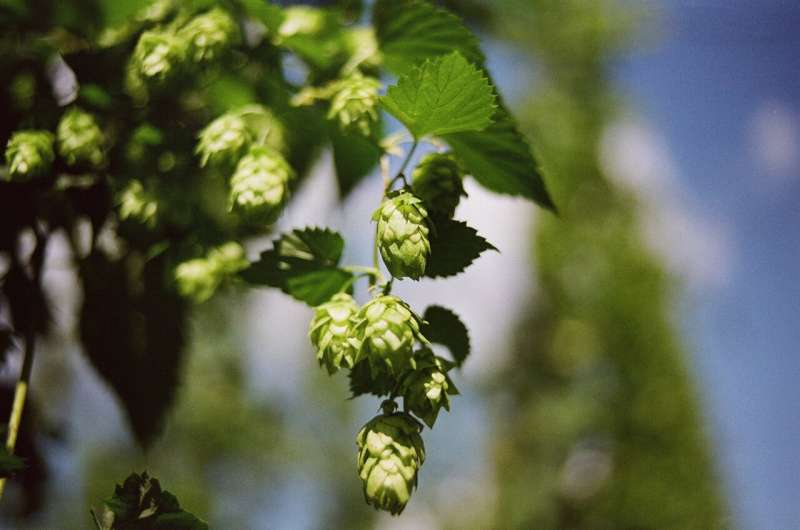
Oregon State University and U.S. Department of Agriculture researchers have significantly expanded the understanding of the hop genome, a development with important implications for the brewing industry and scientists who study the potential medical benefits of hops.
“This research has the unique ability to impact several different fields,” said David Hendrix, an associate professor in the Department of Biochemistry and Biophysics and the School of Electrical Engineering and Computer Science at Oregon State. “If you’re talking to beer drinkers, they will be excited about the brewing side. If you are talking to the medical field, they are going to be excited about the pharmaceutical potential.”
The findings are outlined in a paper just published in the journal The Plant Genome. Hendrix and John Henning, a hop geneticist with the U.S. Department of Agriculture who has an appointment in the Oregon State College of Agricultural Sciences, are co-corresponding authors of the paper.
Demand for hops has surged in recent years as the craft beer industry has grown, fueled by beers, such as India pale ales, that are brewed with a lot of hops. This has led brewers to seek out new varieties of hops. With a better understanding of the hop genome, scientists will have an easier time developing new varieties, which may have qualities such as different flavor profiles or resistance to diseases that infect and damage hop plants.
“This really opens the door wide for breeding hops at the molecular level,” Henning said. “We now have a much better understanding of how traits are being controlled and what genes are involved.”
Compounds founds in hops are also increasingly of interest to medical researchers. For example, scientists at Oregon State have shown that xanthohumol, a natural flavonoid found in hops, may aid in combating cancer and metabolic syndrome. Knowing more about hop genes and how they are regulated creates potential for better understanding how compounds are produced and finding other hop compounds that could improve people’s health.
Hops are part of the Cannabaceae family of plants, which also includes hemp and marijuana. In the just-published paper, the Oregon State researchers found gene structures in the hop genome that were similar to cannabidolic acid synthase, or CBDAS, which produces the precursor structure to CBD, the compound in cannabis plants that has surged in popularity in recent years because of its potential health benefits.
The Oregon State researchers stressed that their finding doesn’t necessarily mean that hops produce CBDA, but it raises questions about the potential to identify new genes involved in the production of different compounds associated with flavoring or therapeutic benefit, and the potential to uncover new compounds in hops.
The researchers sequenced the genome of Cascade, a hop cultivar developed by USDA Agricultural Research Service in the 1960s and credited with helping to launch the craft beer movement. It is the second most widely grown hop variety in the United States today.
The United States is the top hop producing country in the world and Washington, Oregon and Idaho account for nearly all the hop acreage in the United States. In 2019, production of hops in the United States was worth more than $600 million.
Other scientists have attempted to sequence the hop genome, but they have had limited success because it is large—similar in size to the human genome—and complex, Hendrix said. The current research was made possible in part by new genome sequencing and assembly technology developed by Pacific Biosciences of California.
“The previous genomes were basically broken up,” Hendrix said. “They were sequencing a lot of the genes, but they were isolated islands of the genome and they were not really getting the full context of what was going on in those islands. We were able to reveal a more complete and continuous genomic sequence.”
Lillian K. Padgitt‐Cobb et al. A draft phased assembly of the diploid Cascade hop ( Humulus lupulus ) genome, The Plant Genome (2021). DOI: 10.1002/tpg2.20072
Citation:
Scientists advance understanding of hop genome, which could aid brewers, medical researchers (2021, February 22)
retrieved 22 February 2021
from https://phys.org/news/2021-02-scientists-advance-genome-aid-brewers.html
This document is subject to copyright. Apart from any fair dealing for the purpose of private study or research, no
part may be reproduced without the written permission. The content is provided for information purposes only.